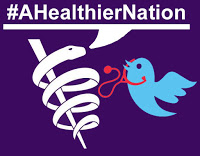Yesterday, while trolling my Twitter streams for content, I happened upon #AHealthierNation chat sponsored by the American Medical Association (AMA). According to AMA’s promo page (here):
“The potential impact of digital technology on health care is undeniable. Our tweet chat examined the role physicians should play in shaping the future of digital medicine and how new innovations can enhance workflow and expand the physician-patient relationship.”
According to symplur analytics, the chat included over 100 participants, more than 500 tweets, and 22.4 million impressions! I was responsible for 10 tweets, which garnered 239,000 impressions.
Seven questions were up for discussion:
- How do you get physicians involved in the development of tools for digital medicine?
- Not everyone can be an inventor, so where do physician feedback opportunities exist?
- Have too many digital solutions overlooked the basics of a physician’s workflow and the need to create efficiencies?
- With user-centered design, what are the biggest challenges for two very different users: physicians and patients?
- For a patient, what does engagement look like? How has the attention around wearables figured into that definition?
- What are the obstacles that must be addressed for wearable to receive broader physician adoption?
- What do we need to learn to make digital health/medicine a success in the future?
Right off the bat the issue of fitting digital tools into physician workflow came up. @drnic1 (a health technology company) said: “Accepting that #DigitalHealth is Part of their future would also be a good start” to get physicians involved. “Involving physicians allows for their insight so that solutions fit seamlessly into existing workflow @ point of care.”
@wareflo asked: “OK. What are we going to do about health IT’s ‘workflow problem?'” I suggested “As Shakespeare might say today: The first thing we do is kill all the IT people.” Of course, I don’t mean that literally. But if your IT people do not understand your workflow limitations, hire new IT people who do!
@thedocsmitty made a radical suggestion: “Point out how digital health can benefit the patient. It’s why we all got into med in the first place.” @jkvedar concurred: “Might be antithetical to say here, but designing around patients might be more important.” I added: “Yes, get patient input, especially for mobile apps (read “Patient Activists Demand Higher Quality Mobile Health Apps“).
Of course, I plugged my book: “HCPs should read my book: ‘Socialize Your Patient Engagement Strategy‘.”
AMA noted that “Physicians are very interested in having a voice in the development of any technology intended for use in practice” and suggested that a “tangible way for physicians to connect to entrepreneurs” is via the new AMA Physician Innovation Network. Unfortunately, that network is not yet available, but you can sign up to receive an email notice when it is available.
I suggested that physician entrepreneurs should contact Bayer @grants4apps program, which recently received the annual Pharmaguy Pioneer Award (see here). That and other pharma programs also offer an abundant opportunity for physicians to provide feedback.
AMA noted that a lot of mention was made about @MATTERChicago in during the #AHealthierNation chat. MATTER is a community of healthcare entrepreneurs and industry leaders working together in a shared space to individually and collectively fuel the future of healthcare innovation.
#AHealthierNation Tweets !function(d,s,id){var js,fjs=d.getElementsByTagName(s)[0],p=/^http:/.test(d.location)?’http’:’https’;if(!d.getElementById(id)){js=d.createElement(s);js.id=id;js.src=p+”://platform.twitter.com/widgets.js”;fjs.parentNode.insertBefore(js,fjs);}}(document,”script”,”twitter-wjs”);









![6 Digital Tools at the Center of Healthcare Digitalization [INFOGRAPHIC]](http://ec2-54-175-84-28.compute-1.amazonaws.com/pharma-mkting.com/wp-content/uploads/2021/04/6DigitalTools_600px-100x70.jpg)




